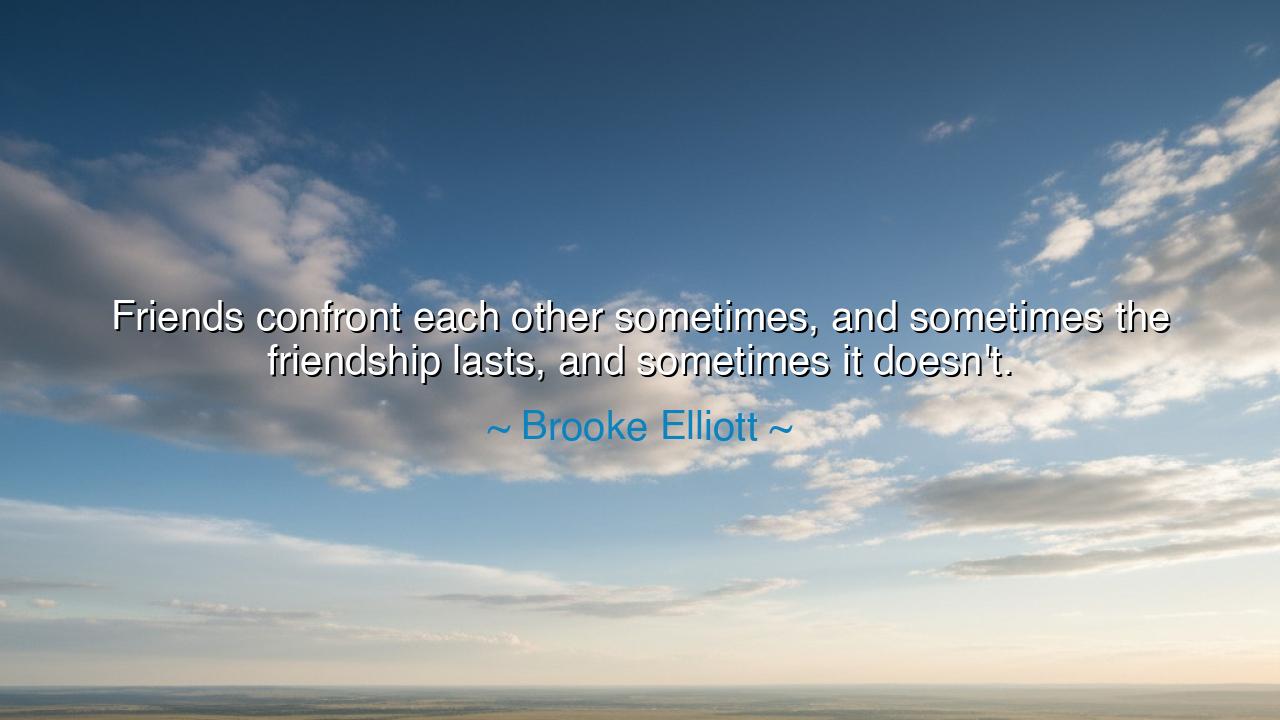
Friends confront each other sometimes, and sometimes the
Friends confront each other sometimes, and sometimes the friendship lasts, and sometimes it doesn't.






"Friends confront each other sometimes, and sometimes the friendship lasts, and sometimes it doesn't." These words from Brooke Elliott strike at the very heart of human relationships—the raw and powerful truths that lie beneath the surface of friendship. To be friends with someone is not merely to bask in shared moments of joy and companionship. It is to face the discomfort of challenge, of confrontation, and to learn whether the bond between you can withstand the tests of time, disagreement, and change. Friendship, as Elliott reminds us, is not a simple, smooth path; it is a journey filled with moments of both harmony and discord, and it is the strength of the connection that determines whether the relationship endures or falters.
This idea is not new; the ancients were well aware of the complexities inherent in friendship. In Plato’s Symposium, the great philosopher Socrates speaks of love and friendship as dynamic forces—forces that are not merely passive, but that require work and sacrifice. True friendship, he suggests, is not about blind agreement or avoiding confrontation; it is about challenging each other, questioning each other’s beliefs, and growing together through those challenges. Friendship, therefore, is both a bond and a process—a continuous engagement with another person that evolves through moments of joy and sorrow, peace and conflict.
Consider the friendship between Achilles and Patroclus, whose bond, as depicted in Homer’s Iliad, was forged in both battle and in moments of deep emotional confrontation. When Achilles withdrew from the fight, angered by a slight, it was his confrontation with his own feelings of pride and loss that ultimately led to the tragic downfall of his closest companion, Patroclus. Their friendship, like many in the ancient world, was not defined by simple affection or unbroken harmony; it was shaped by the conflicts and struggles they faced together. Even in the shadow of confrontation, their bond proved to be a defining force in their lives, one that persisted despite the challenges.
The confrontation within friendship is an essential rite of passage for any bond to grow and mature. This is echoed in Aristotle’s writings, where he distinguishes between different kinds of friendships: those based on utility, those based on pleasure, and the highest form, those based on virtue. Virtuous friendships are the most enduring, Aristotle argues, not because they are free from conflict, but because they are grounded in a shared commitment to goodness and a willingness to challenge each other in the pursuit of virtue. Such friendships, while they may endure moments of tension and disagreement, ultimately strengthen through the confrontations they face, because they are anchored in something deeper than mere affection or personal gain.
Brooke Elliott’s reflection on friendship speaks to the reality that not all confrontations lead to enduring bonds. Some friendships, despite the best efforts of both parties, simply do not survive the weight of time and disagreement. There are moments when a friendship becomes untenable, when the differences between individuals are so great that the relationship fractures under the strain. Yet, even in these painful separations, there is wisdom to be gained. The end of a friendship, particularly one that was once deep and meaningful, can be a powerful teacher, reminding us that all things in life are impermanent, and that some relationships serve their purpose in our lives for a season, and not for eternity.
In our own lives, we must come to terms with the fact that not every friendship will last forever, no matter how much we wish it to. We must learn to value the time we have with our friends, knowing that confrontations and disagreements will inevitably arise. But how we face those moments—how we respond to the challenges in our relationships—determines whether we emerge from them stronger or weaker. If we approach confrontation with a spirit of understanding, a willingness to listen, and an openness to growth, we may find that these difficult moments deepen the bond between us and our friends. But if we approach them with pride or resentment, we risk letting the relationship falter and fade.
Thus, the lesson is clear: friendship is a living, breathing entity, one that requires care, attention, and the courage to face difficult truths. Confrontations within friendships are not to be feared, for they are an opportunity for growth, both personal and relational. We must not shy away from those moments of tension, but rather approach them with the understanding that growth often arises from discomfort. Let us embrace the challenges in our friendships, knowing that through them we can forge stronger, more authentic connections. And when a friendship does come to an end, let us honor it, reflect on what it has taught us, and carry its lessons forward into the relationships that will shape our future.
In the end, friendship is not about avoiding confrontation; it is about how we rise to meet it, how we transform these moments into opportunities for deeper connection. As the ancients understood, it is through these trials that we come to understand not just each other, but ourselves. Let us seek out friendships that challenge us, that make us better, and may we face those challenges with open hearts, knowing that in the end, it is the willingness to confront, to learn, and to grow that gives friendship its true power.






AAdministratorAdministrator
Welcome, honored guests. Please leave a comment, we will respond soon